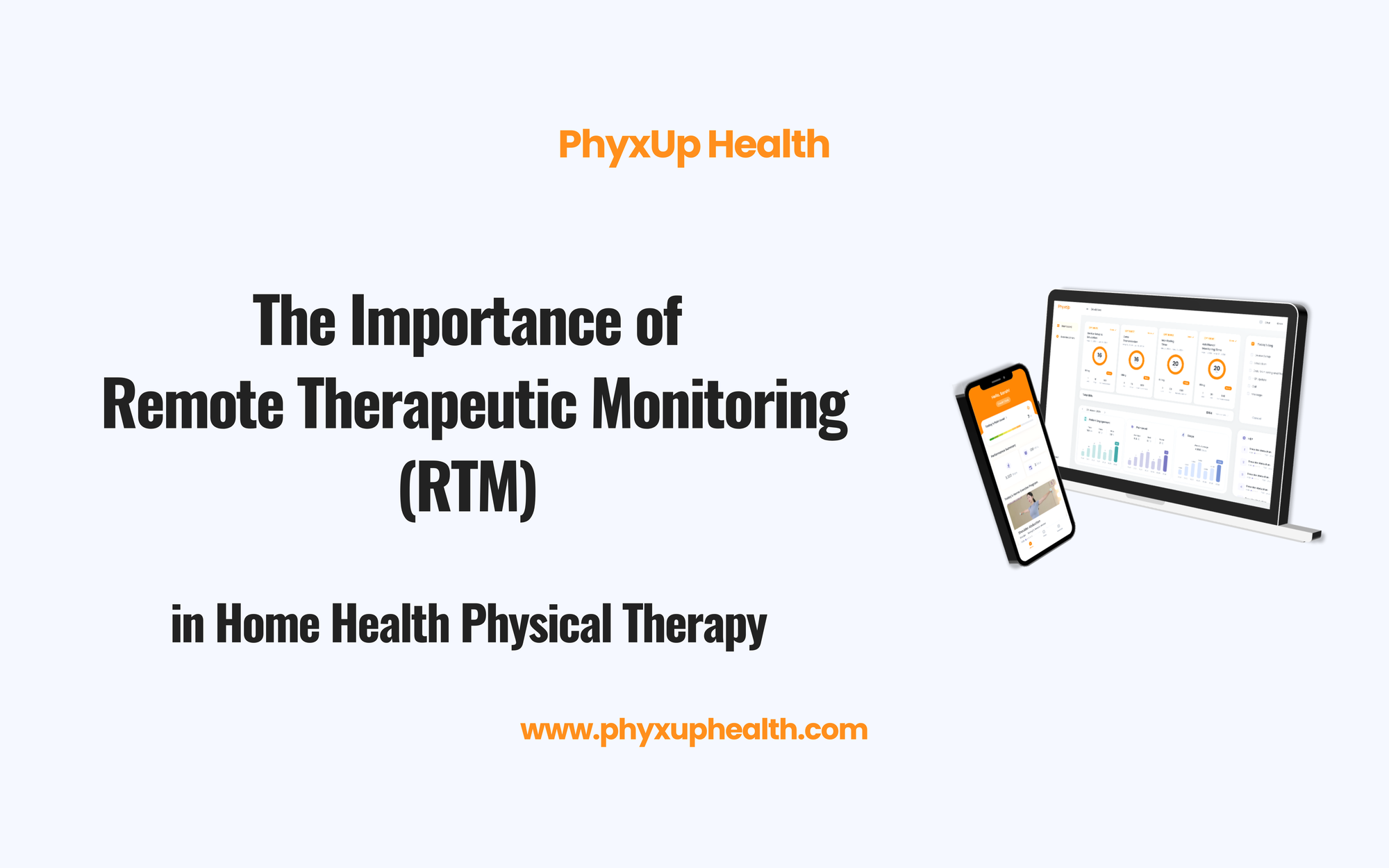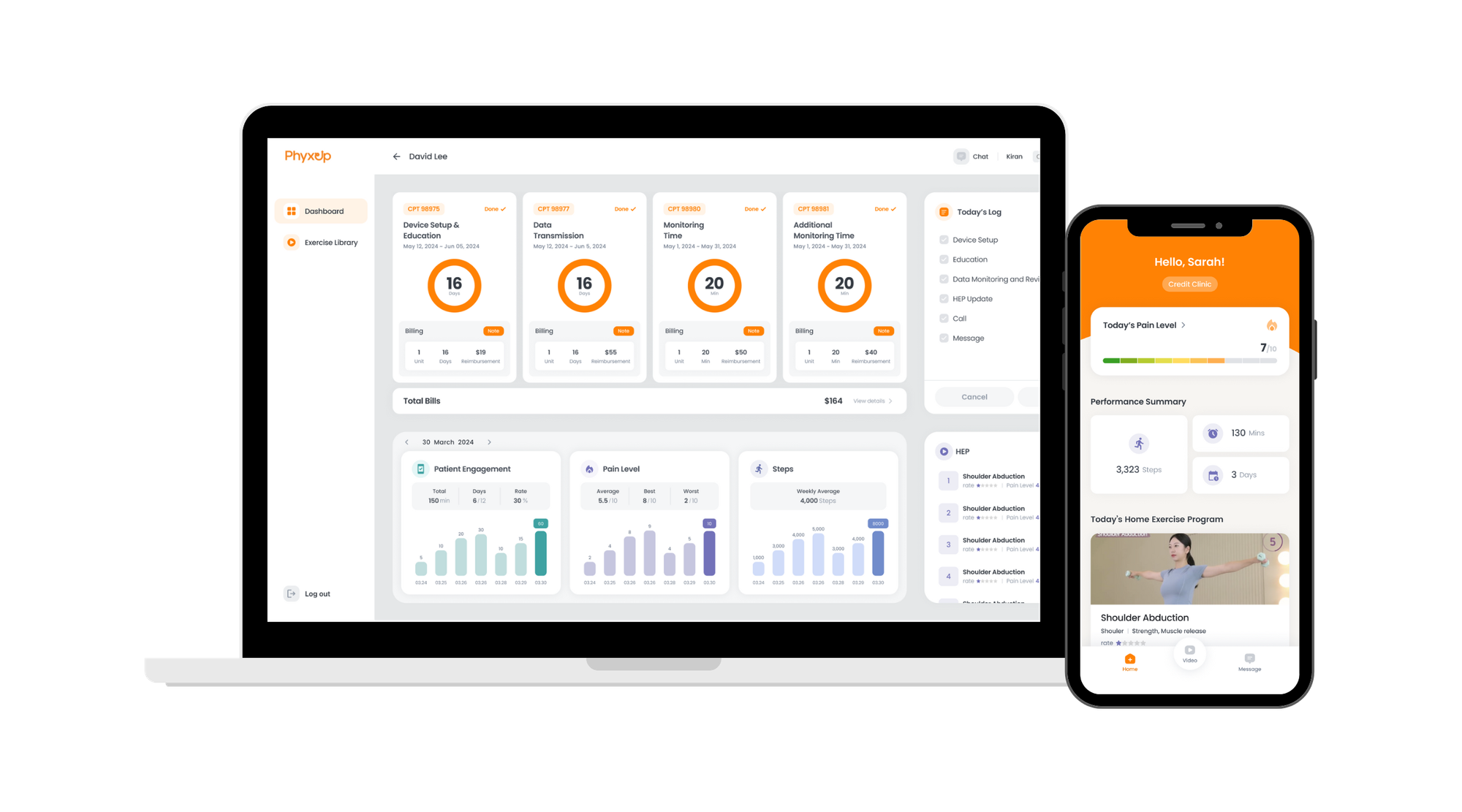Why Remote Therapeutic Monitoring (RTM) is Crucial for Home Health Physical Therapy

Remote Therapeutic Monitoring (RTM) is transforming home health physical therapy by allowing physical therapists to track and monitor patient progress remotely, in real-time. With its web/app-based platform, RTM makes rehabilitation more accessible, flexible, and patient-centric. It extends physical therapy beyond clinic walls, enabling more personalized, effective care tailored to individual needs.
In this article, we will explore the significance of RTM in home health physical therapy and highlight three key benefits: improving patient safety, boosting engagement in home exercise programs, and strengthening the trust between therapists and patients.
What Is Remote Therapeutic Monitoring (RTM)?
Remote Therapeutic Monitoring (RTM) is a digital health tool designed to allow physical therapists to track patient progress remotely. By collecting data on mobility, pain levels, and exercise adherence, RTM empowers therapists to assess the effectiveness of treatments and make timely adjustments. This ensures personalized and optimized rehabilitation.
Financial Benefits of RTM
RTM offers substantial financial benefits for physical therapy practices. Medicare and other commercial insurers reimburse RTM services under CPT codes 98975, 98977, 98980, and 98981, creating an additional revenue stream while improving patient care and boosting operational efficiency.
Key Benefits of RTM for Home Health Physical Therapy
- Prioritizing Patient Safety: Safety is a critical concern in home health physical therapy, where patients perform exercises without direct supervision. Improper movements or overexertion can lead to setbacks or injuries.
1) Real-time Monitoring: Therapists can track key data points, such as pain levels and gait speed, allowing for timely interventions.
2) Personalized Adjustments: Data-driven modifications to exercise routines reduce the risk of injury and enhance treatment effectiveness.
2. Increasing Patient Engagement in Home Exercise Programs: One of the biggest challenges in home health physical therapy is maintaining patient engagement. Without in-person supervision, many patients struggle with adherence and motivation.
1) Automated Exercise Reminders: Ensures patients stay on track with their prescribed routines.
2) Progress Tracking: Visual dashboards help patients see improvements over time, reinforcing motivation.
3) Gamification Features: Some RTM platforms include rewards and goal-setting to boost engagement.
4) Interactive Communication: Patients can easily ask questions and receive feedback from their therapists.
3. Strengthening the Therapist-Patient Relationship A strong therapist-patient relationship is essential for successful rehabilitation. However, in home health settings, direct interactions are often limited. RTM bridges this gap by enabling ongoing communication and feedback.
1) Continuous Communication: Patients can message therapists directly for guidance and reassurance.
2) Personalized Care: Real-time data allows therapists to tailor treatment plans to meet each patient’s needs.
3) Transparent Progress Reports: Patients can track their recovery journey and understand their improvements.
4) Timely Interventions: Therapists can respond promptly to pain reports or exercise difficulties.
Challenges of Implementing RTM in Home Health Physical Therapy
While RTM offers numerous benefits, there are a few challenges to consider in its implementation:
- Technology Adoption: Some patients, especially older adults, may struggle with using RTM platforms. Ensuring user-friendly interfaces and providing clear instructions can help overcome this barrier.
- Reimbursement and Billing: While Medicare and other insurers cover RTM, the billing process can be complex. Partnering with billing experts or using automated RTM billing solutions, such as PhyxUp Health, can streamline reimbursement and reduce administrative overhead.
- Data Security and Compliance: RTM involves handling sensitive patient data, so maintaining HIPAA compliance and ensuring cybersecurity are critical. Choosing a secure and compliant platform is essential for safeguarding patient data.
The Role of Automation in Enhancing RTM
Automated RTM solutions streamline processes for physical therapists, improving patient outcomes. By reducing manual tasks and enhancing efficiency, automation makes RTM more scalable and effective for home health physical therapy.
Key Areas of RTM Automation:
- Monitoring Automation: Tracks patient progress in real time, with automated alerts for therapists based on changes in pain levels, mobility, or exercise adherence, ensuring timely interventions without manual oversight.
- Billing & Reimbursement Automation: Automatically documents and processes RTM services for Medicare and commercial insurance reimbursement, reducing administrative workload and minimizing billing errors.
- SOAP Note Automation: Automatically structures data collected from patient monitoring into SOAP notes, saving therapists time on documentation while maintaining accuracy and compliance.
By integrating automation, RTM helps physical therapists focus on patient care while improving clinic efficiency and financial sustainability.
Case Study: Successful RTM Implementation
Background: A home health physical therapy practice implemented an RTM solution to enhance patient outcomes and streamline operations.
Results:
- Increased Adherence: Patients using RTM showed a 40% improvement in adherence to home exercise programs.
- Reduced Readmission Rates: Real-time monitoring enabled early interventions, resulting in a 25% reduction in hospital readmissions.
- Higher Patient Satisfaction: Patients reported feeling more supported and engaged in their rehabilitation journey.
This case study highlights the tangible benefits of RTM in home health physical therapy, demonstrating its effectiveness in improving patient care and operational efficiency.
How PhyxUp Health Supports RTM in Home Health Physical Therapy
PhyxUp Health provides an automated RTM solution designed to support physical therapists in delivering high-quality home health care. The platform offers advanced monitoring, automated tracking, reimbursement support, and seamless integration with clinical workflows.
Key Features of PhyxUp Health’s RTM Solution:
- Real-time Patient Monitoring: Track pain levels, mobility, and exercise adherence.
- Automated Billing & Reimbursement Support: Streamline RTM billing with Medicare and private payers.
- Seamless Workflow Integration: Easily incorporate RTM into existing practices.
- Comprehensive Onboarding & Training: Ensure smooth implementation for the team.
- Engaging Home Exercise Programs: Evidence-based routines keep patients active and motivated.
With PhyxUp Health, home health physical therapy becomes safer, more efficient, and financially sustainable, enabling therapists to provide superior care.

Conclusion: RTM – The Future of Home Health Physical Therapy
RTM is transforming home health physical therapy by enhancing safety, engagement, and therapist-patient relationships. Through real-time monitoring and interactive communication, RTM ensures better patient adherence and improved outcomes.
For more information on how PhyxUp Health can support your RTM needs, visit our website at www.phyxuphealth.com to explore our solutions.
